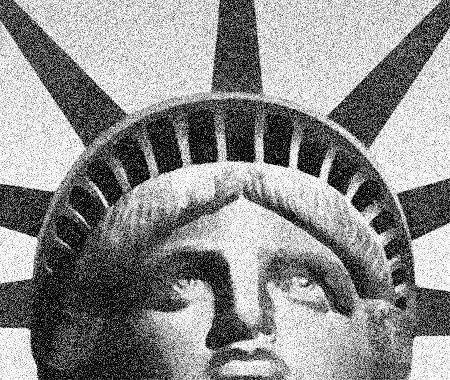The American Civil Liberties Union Foundation of Colorado (ACLU) today released documents revealing that the Colorado Springs Police Department has collected intelligence information on the free speech activities of peaceful critics of government policy and has sent its information directly to the Denver Police Department for inclusion, with other information about First Amendment activities in Colorado Springs, in the controversial Denver Police Spy Files.
"Earlier this year we learned that individuals cannot attend a peaceful rally in Denver without fear that their names will wind up in a criminal intelligence file," said Mark Silverstein, ACLU Legal Director. "Now it appears that peaceful protesters in Colorado Springs are subject to the same kind of illegitimate political surveillance. At a time when the Pentagon is proposing an Orwellian data-mining program to track the most intimate details of our lives, how many more Colorado cities are keeping files on peaceful protest activities that have absolutely no connection to criminal activity?"
Last March, the ACLU disclosed that Denver police were monitoring peaceful rallies, conducting surveillance of peaceful protest activities, and keeping criminal intelligence files on the free speech activities of law-abiding advocacy organizations, in some cases branding them falsely in the files as "criminal extremist." An ACLU class action lawsuit challenging the Denver police practices is pending in federal court in Denver.
The documents released today come from the Denver police file on Citizens for Peace in Space, a Colorado Springs-based organization that seeks to ban the use of nuclear weapons. The group obtained its file from Denver in the course of a review and purge of the Spy Files prompted by the ACLU's disclosure of Denver's political spying last March.
"These newly-released files strongly suggest that Colorado Springs police officers maintain the same kind of spy files as their counterparts in Denver," Silverstein said. "The documents clearly show that Denver and Colorado Springs coordinated their surveillance of peaceful protesters to track the American Friends Service Committee and the Colorado Coalition to Prevent Nuclear War as their members drove from Denver to join a peaceful and lawful demonstration outside Peterson Air Force Base in Colorado Springs in 1999."
One document, written by Denver Intelligence officer James Wattles, reports that 80 persons attended the peaceful demonstration. It lists the plate numbers of 30 participants' cars, along with corresponding names and home addresses (although the Denver Police Department blacked out the individual names before releasing the document.) According to the report, the Colorado Springs Police Department supplied the license plate numbers to the Denver Intelligence Bureau.
The final portion of the report reflects surveillance conducted in Denver earlier the same day at the office of the American Friends Service Committee (AFSC), one of the plaintiffs in the ACLU lawsuit. It states that four vehicles left for the demonstration and it notes that passengers included the AFSC director and a representative of Colorado Coalition for the Prevention of Nuclear War. Relying on the information supplied from Colorado Springs police, the report confirms that the same four vehicles arrived at the Colorado Springs demonstration.
"This document demonstrates that Colorado Springs police diligently recorded at least 30 license plate numbers and forwarded them directly to the Denver's Intelligence Unit," Silverstein said. "Someone evidently 'ran' the plate numbers through a law enforcement computer to obtain the names and home addresses that appear in this report. Neither police agency had any suspicion that criminal activity was involved. They had no valid law enforcement purpose whatsoever for this political surveillance."
"Colorado police agencies need to learn that a public gathering where individuals peacefully criticize government policy is not a crime scene; it is not criminal activity and it is not suspicious activity," Silverstein added. "On the contrary, it is activity that it protected by the United States and Colorado Constitutions."
Another document the ACLU disclosed shows that a Denver intelligence officer traveled to Colorado Springs to attend a conference at Colorado College about the dangers of nuclear proliferation. He then filed a report detailing the views expressed by the speakers and listing the peace activists he recognized in the audience.
In a third document, Denver intelligence officers report that AFSC and Citizens for Peace in Space sponsored a conference in Denver titled "Space, Nukes, and International Law." The report shows that Denver intelligence officers collected the license plate number of vehicles in the parking lot and then listed the corresponding names and home addresses in the Spy Files.
The ACLU released an additional Denver police document that reports that the Pikes Peak Justice & Peace Commission (PPJPC), also based in Colorado Springs, works closely with Citizens for Peace in Space and publishes a newsletter. The report lists PPJPC members and their addresses; lists the additional individuals responsible for editorial and distribution tasks connected with the newsletter; and lists 10 additional individuals that the report states are "associated" with the two peace groups.
"People should be free to attend an educational conference, work on a newsletter, join a peace group, or attend a peaceful rally without fear that their names will wind up in a police dossier," Silverstein said. "These documents make it clear that the Denver police have been building these Spy Files about First Amendment activities in Colorado Springs with the active assistance of the Colorado Springs Police Department. That raises serious questions whether the Colorado Springs police also maintain the same kind of political surveillance files on peaceful protesters that has prompted controversy, and a class action lawsuit, in Denver."
Date
Thursday, November 21, 2002 - 2:00amFeatured image

